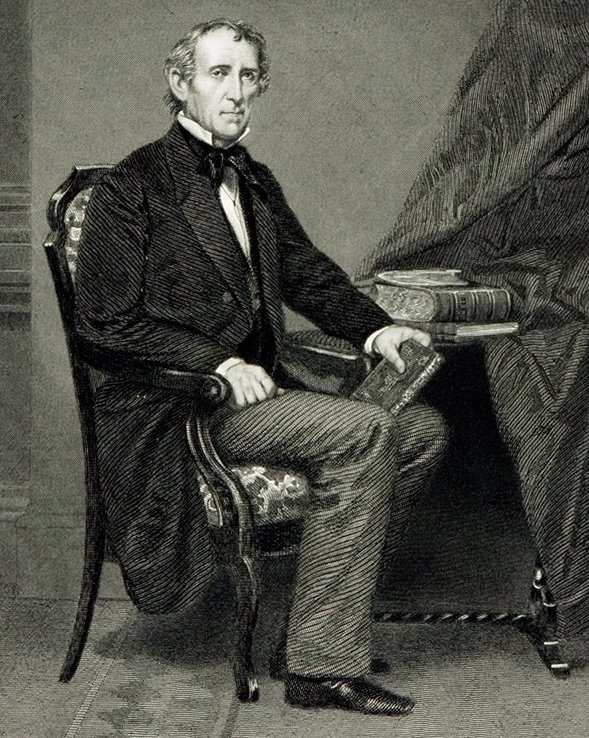
By Jim O’Neal
The election year of 1844 found President John Tyler in the awkward position of having no political party willing to nominate him for re-election. Tyler’s extreme use of his veto pen had alienated the Whigs, who were exasperated with his stubbornness and unwillingness to negotiate.
Earlier in February, the president, his cabinet members and several hundred prominent individuals (including Dolley Madison) were on the new steam-powered warship the USS Princeton when a gun’s celebratory shot exploded. When the smoke cleared, eight men lay dead, including Secretary of State Abel Upshur, Secretary of the Navy Thomas Gilmer and ex-New York Senator David Gardiner.
Tyler ordered the bodies taken to the White House and laid in state in the East Room, where the funerals were held before burial in the Congressional Cemetery. Gardiner’s daughter Julia had been carried from the ship by President Tyler and chose to stay on at the White House to fully recuperate. Tyler’s first wife Letitia was the first First Lady to die in the White House and the president struck up a relationship with (the now-wealthy) Julia Gardiner. They were married four months later on June 16, 1844, causing quite a stir in the social circles of Washington. Tyler was 54 and Julia was 30 years younger. Over the years, she would bear seven children to join the eight from the earlier marriage.
Meanwhile, the Democratic National Convention in Baltimore was deadlocked between Martin Van Buren and Lewis Cass of Michigan. Then they received word that James Knox Polk was former President Andrew Johnson’s choice and so “Young Hickory” Polk was picked unanimously on the ninth ballot. When Polk’s nomination was flashed from Baltimore to Washington by Samuel F.B. Morse’s telegraph – the first official use of this new communication tool – Washington observers were sure the instrument had failed because the news was not plausible. Henry Clay, the Whig nominee, sarcastically asked, “Who is James K. Polk?”
It was a close contest, but Polk became the first “Dark Horse” candidate to win and the only Speaker of the House (ever) to be elected president. The 49-year-old Polk was also the youngest man to ever become president – to that time – when he took the oath of office on a rainy March 4, 1845. However, three days earlier on March 1, Congress passed a joint House-Senate resolution approving the annexation of Texas and Tyler signed it. And on his last day in office, Tyler also signed legislation admitting Florida as the 27th state.
On the same day, March 3, Congress mustered enough votes (two-thirds in each house) to override one of Tyler’s vetoes … the first time in history a presidential veto had been overridden. Immediately after Polk’s inauguration, Tyler and his family left for Virginia. Two days later, the Mexican minister to Washington filed a protest, calling the annexation of Texas an “act of aggression.” Mexico broke off diplomatic relations and the Mexican War soon followed.
Welcome to Washington, Mr. President.
 Intelligent Collector blogger JIM O’NEAL is an avid collector and history buff. He is President and CEO of Frito-Lay International [retired] and earlier served as Chairman and CEO of PepsiCo Restaurants International [KFC Pizza Hut and Taco Bell].
Intelligent Collector blogger JIM O’NEAL is an avid collector and history buff. He is President and CEO of Frito-Lay International [retired] and earlier served as Chairman and CEO of PepsiCo Restaurants International [KFC Pizza Hut and Taco Bell].
